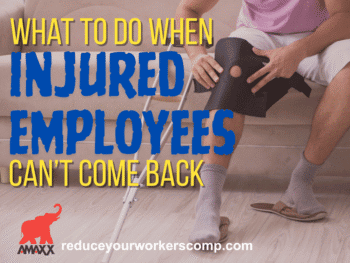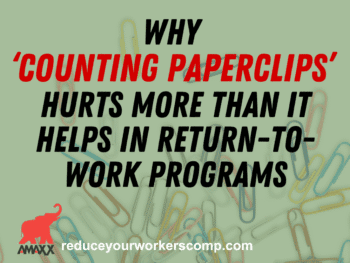One main theme of effective workers’ compensation programs is focusing on employer/employee satisfaction with the system and returning workers to work in a timely manner. The following study reinforces the importance of providing immediate medical care for workers following an injury and transitional duty and return to work programs. (See WCK Blog: “Workers’ Compensation and Injured Workers – It Isn’t “US” Against “THEM”).
In Michigan, the Workers’ Compensation Research Institute (WCRI) conducted a study, Comparing Outcomes for Injured Workers in Michigan analyzing how Michigan compared with 10 other states within the context of this “key value proposition.”
The study juxtaposed worker outcomes in each study state within the areas of recovery of physical health and functioning, return to work, access to health care and satisfaction with health care with data on the costs and utilization of medical care and found:
1. On average, employers in Michigan paid less for medical care per claim with more than seven days of lost time than most other study states.
2. The average paid medical cost per claim with more than seven days of lost time was 27% lower than the average medical cost in the median of the 11 states studied, largely due to a lower than typical fee schedule.
3. Recoveries of injured workers in Michigan were in the middle of the range of states studied with the average worker in Michigan receiving a typical amount of medical care and reporting a typical physical recovery after an injury.
4. Workers in Michigan had return-to-work outcomes typical of the study states. Some 10% of Michigan workers reported never returning to work; 14% reported never having a substantial return to work (one that lasted at least one month) predominantly due to their injury as of 2.5 years post injury.
5. Michigan workers typically returned to substantial employment about nine weeks after their injury, putting the state in the middle of the group of states. Only 22 percent of Michigan workers did not have a substantial return to work one year post injury – a better outcome compared to most other states studied.
WCRI found compared to 10 other states, outcomes for injured workers in Michigan were generally in the middle of the range on most measures.
The study also found:
1. The vast majority of workers in Michigan reported they were somewhat or very satisfied with the timeliness of their first visit to their initial and primary provider (83% and 79% for each measure, respectively).
2. 14% of workers reported they were very dissatisfied with how quickly they saw their primary provider after their injury, similar to the middle group of states (10% to 14%).
3. 12% percent reported “big problems” in gaining access to the primary provider they wanted.
4. 82% reported they were somewhat or very satisfied overall with the care they received. Although approximately 1 in 10 said they were very dissatisfied with their medical care, this was still in the middle of the range of states studied.
5. Michigan had among the lowest percentage of workers who wanted to change their primary provider due to dissatisfaction with their care. Fewer Michigan workers wanted to change providers than in most other study states. (workersxzcompxzkit).
The study consisted of telephone interviews with 786 workers in Michigan who received workers’ compensation income benefits for injuries between October 2005 and September 2006. The interviews were conducted during September and October 2008 – on average, about two and one-half years after the dates of the workers’ injuries.
Author: Robert Elliott, J.D.
Click on these links to try it for yourself.
WC Calculator: www.ReduceYourWorkersComp.com/calculator.php
TD Calculator: www.ReduceYourWorkersComp.com/transitional-duty-cost-calculator.php
WC 101: www.ReduceYourWorkersComp.com/workers_comp.php
Do not use this information without independent verification. All state laws are different. Consult with your corporate legal counsel before implementing any cost containment programs.
©2008 Amaxx Risk Solutions, Inc. All rights reserved under International Copyright Law. If you would like permission to reprint this material, contact Info@WorkersCompKit.com



























